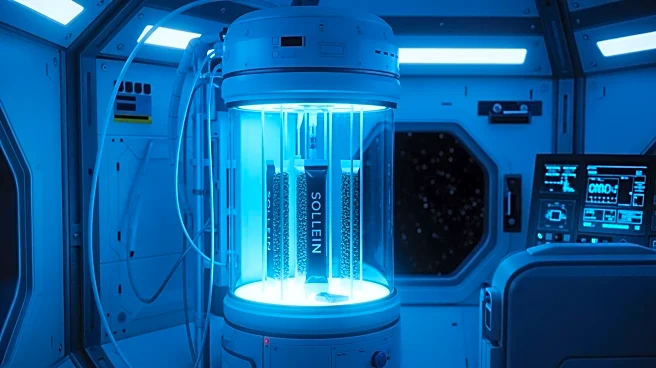What's Happening?
The European Space Agency (ESA) is exploring innovative food solutions for long-duration space missions through its project HOBI-WAN. This initiative is part of the Terrae Novae Exploration Programme and focuses on testing Solein, a powdered protein developed
by Finnish company Solar Foods. Solein is produced using microbes, air, and electricity, and can be manufactured in space with minimal resources. The project aims to improve the autonomy and resilience of human spaceflight, particularly for missions to the moon and Mars. The protein synthesis process in space will utilize urea, an organic compound found in urine, as a nitrogen source. Over the next eight months, Solar Foods will collaborate with OHB System AG to develop the technology necessary for testing Solein production in space, with plans to conduct trials aboard the International Space Station (ISS).
Why It's Important?
The development of Solein as a sustainable food source for space missions is crucial for reducing dependency on Earth-based supplies, which are impractical for distant missions. This innovation could significantly enhance the feasibility of long-duration missions by providing astronauts with a reliable and autonomous food source. The success of this project could lead to advancements in space exploration, allowing for more extended stays on the moon and potential missions to Mars. It also represents a step forward in utilizing biotechnology to solve logistical challenges in space travel, potentially benefiting future space colonization efforts.
What's Next?
If the ground tests are successful, the next phase will involve testing Solein production aboard the ISS. This will confirm whether the protein can be synthesized in the space environment as effectively as on Earth. The results could pave the way for implementing Solein as a staple food source for astronauts on long-duration missions. The ESA's efforts may also inspire further research into sustainable food production technologies for space exploration, potentially influencing future mission planning and resource management strategies.
Beyond the Headlines
The use of urea as a nitrogen source in space highlights the potential for recycling human waste products into valuable resources, promoting sustainability in space missions. This approach could lead to broader applications in closed-loop life support systems, reducing the need for resupply missions and enhancing the self-sufficiency of space habitats. Additionally, the success of Solein could stimulate interest in similar biotechnological solutions for Earth-based food production, addressing global food security challenges.

















